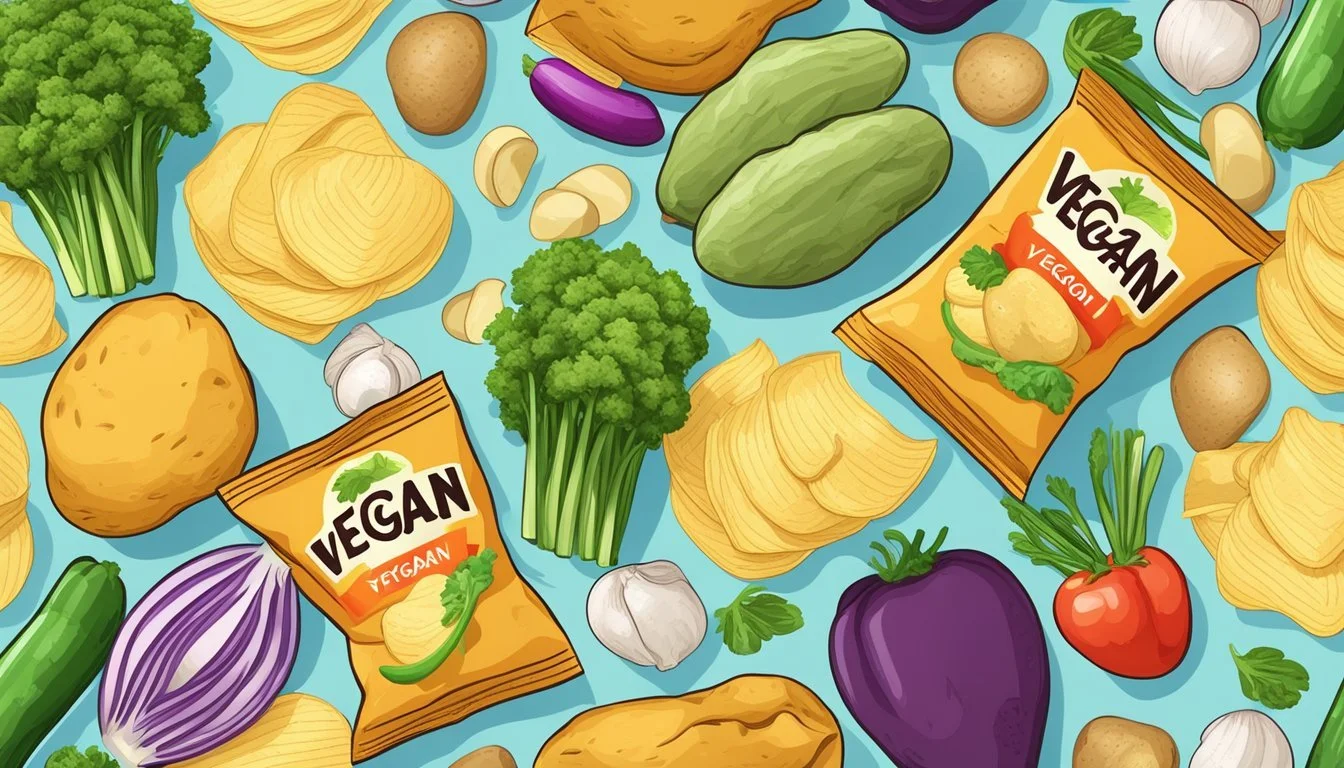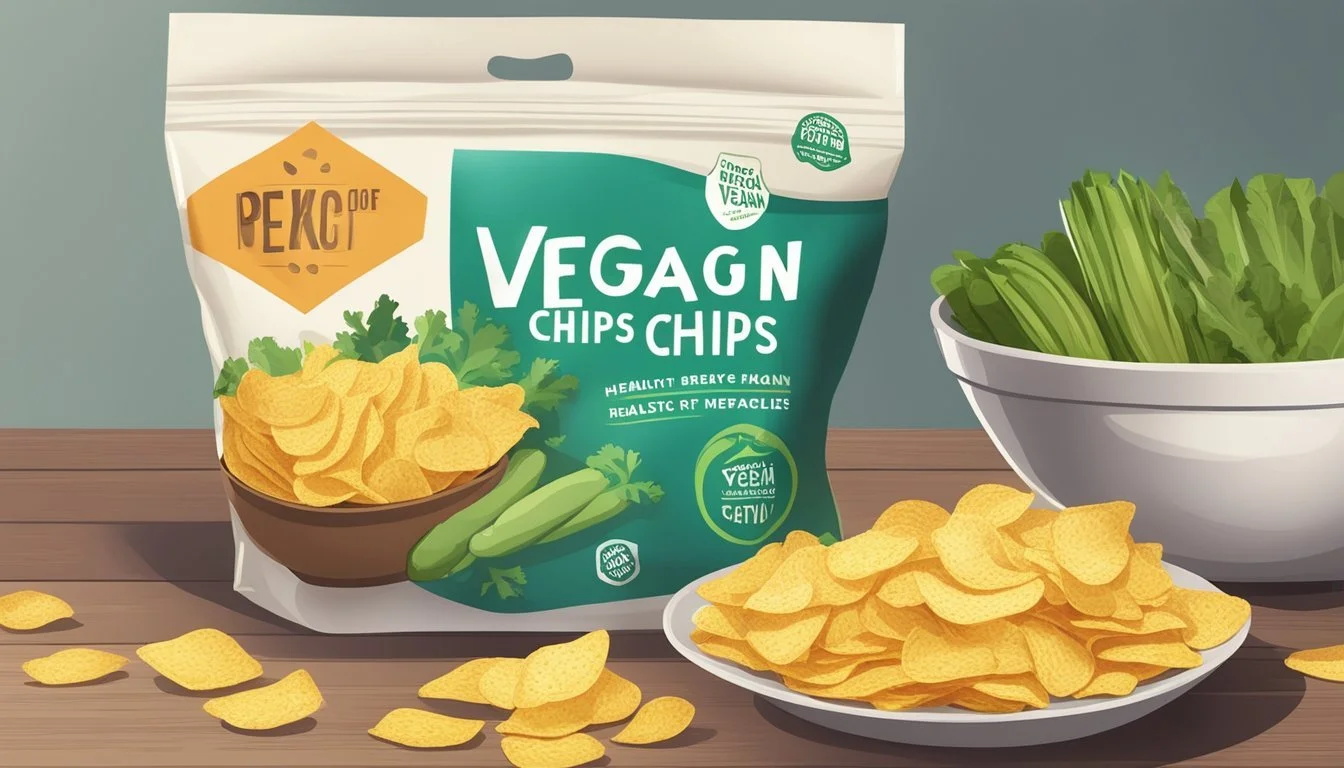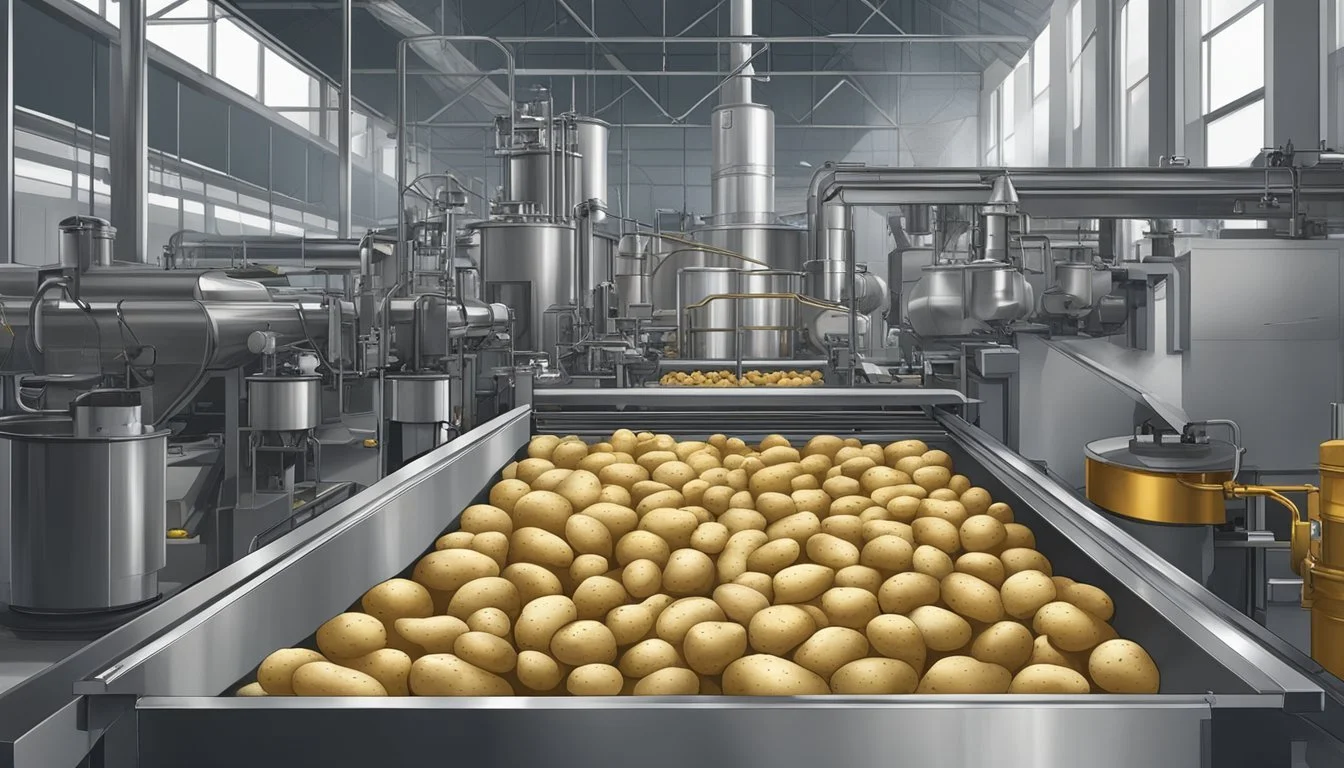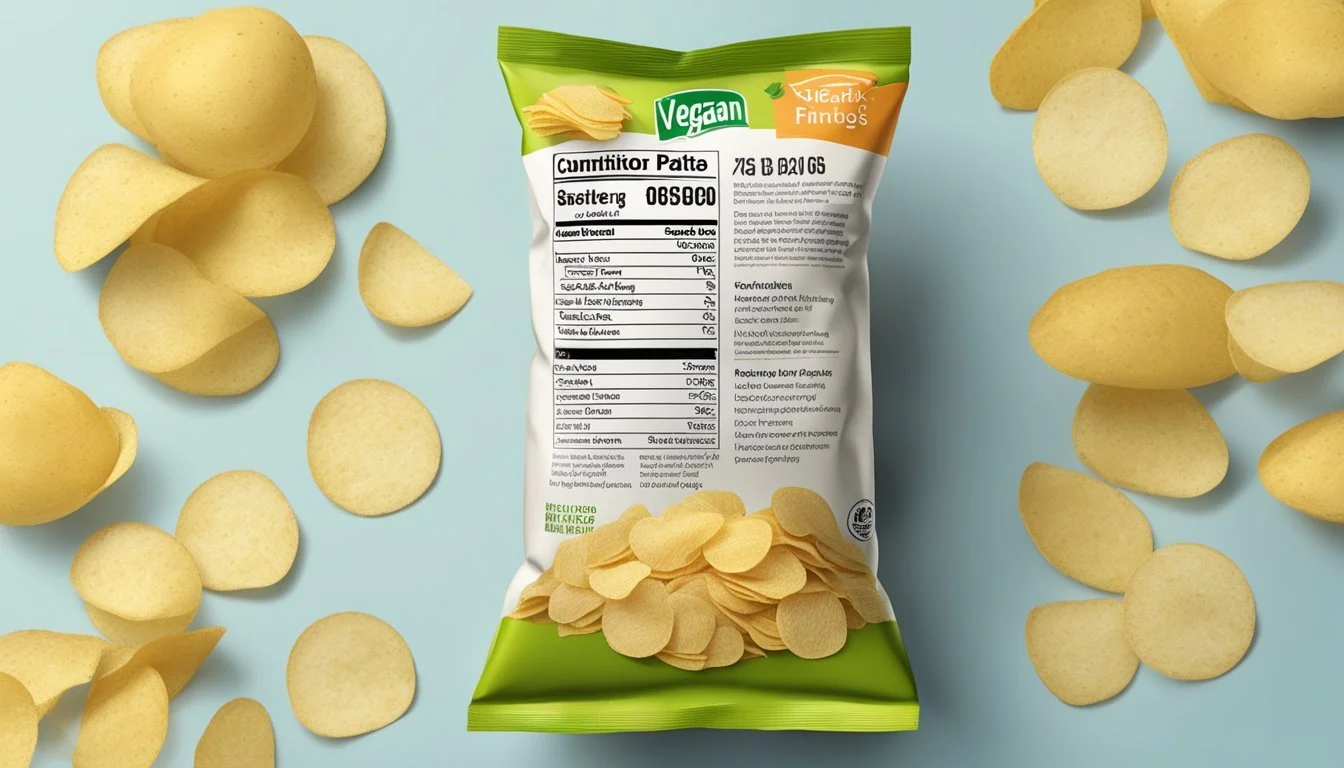Are Potato Chips Vegan?
Unveiling the Snack's Plant-Based Status
The question of whether potato chips are vegan often arises within the plant-based community due to the popularity of this snack. Fundamentally, potato chips are made from potatoes, oil, and salt, which are all vegan-friendly ingredients. However, the vegan status of potato chips can become complicated with the introduction of flavorings and additives.
Most original or classic flavored potato chips are typically suitable for vegans as they contain no animal-derived ingredients. On the other hand, many flavored chips, such as those with cheese, sour cream, or other dairy-based seasonings, are not vegan. It is important for consumers adhering to a vegan diet to scrutinize ingredients lists, as products may contain hidden animal derivatives such as buttermilk, whey, or lactose.
While some popular brands offer vegan options, including plain salted and certain spicy varieties, others contain non-vegan ingredients, particularly in their more savory or uniquely flavored selections. Consequently, vegans must remain vigilant, ensuring that their potato chip indulgences align with their dietary choices.
Understanding Veganism
In the context of dietary choices, understanding what constitutes a vegan product is crucial for those adhering to a vegan lifestyle. This is especially pertinent when considering common snack foods such as potato chips.
Defining 'Vegan'
A vegan diet consists strictly of plant-based foods and excludes all animal products and byproducts. Individuals following this diet consume vegan ingredients, which are derived solely from plants. For a product to be considered vegan, it must not contain any animal-derived ingredients nor should it be processed using animal substances. Certified vegan labels indicate that a product meets the standards set by vegan certification organizations and is free from animal involvement both in ingredients and production.
Animal Products and Byproducts
Animal products refer to anything obtained from animals, such as meat, dairy, and honey. Byproducts, on the other hand, are secondary products derived from animals which may not be as apparent. For example, gelatin, derived from animal bones, and casein, a protein found in milk, are both animal byproducts. Vegan potato chips should be free from these substances. While potato chips can be made with simple plant-based ingredients like potatoes, oil, and salt, some flavors and brands may incorporate non-vegan elements such as cheese or artificial flavors derived from animal sources.
Potato Chips Composition
Potato chips typically consist of a few base ingredients, yet the inclusion or exclusion of additional components determines their suitability for a vegan diet.
Ingredients Breakdown
The fundamental constituents of potato chips are potatoes, vegetable oil, and salt. Here's a concise examination:
Potatoes: The primary ingredient, potatoes are a vegan-friendly starch.
Vegetable Oil: Commonly used oils include canola, sunflower, or corn oil, all of which are plant-based.
Salt: Extracted from seawater or mined from salt deposits, salt is a mineral additive safe for vegans.
Additional ingredients can include flavoring agents, colorings, and preservatives, which can vary significantly by brand and variety.
Common Non-Vegan Additives
Certain flavorings and additives are derived from animal products, making some potato chips non-vegan. Here's an overview of common non-vegan ingredients found in potato chips:
Dairy: Including milk powder, cheese, whey, and casein, which are found in many flavored varieties.
Animal Fats: Sometimes used instead of vegetable oils for cooking or flavoring.
Honey: A sweetening agent used in certain flavors.
Sugar: Can be processed with animal bone char, thus some vegans avoid it.
Preservatives: While not inherently non-vegan, certain preservatives are tested on animals.
To ensure the vegan integrity of potato chips, one should examine the ingredient list for these specific non-vegan components.
Popular Brands and Vegan Options
When considering potato chips, many mainstream brands offer varieties that are suitable for a vegan diet, while others focus entirely on creating vegan-friendly options.
Mainstream Brands and Varieties
Mainstream brands often feature a selection of products that inadvertently cater to vegan consumers, sometimes labeled as "accidentally vegan." For instance:
Lay's Classic Potato Chips are made with just potatoes, vegetable oil, and salt, making them a vegan-friendly choice.
Pringles Original also fits the vegan profile, but it's essential to cross-check other flavors as they may contain milk or cheese derivatives.
Fritos Original Corn Chips stand out as a vegan option within the corn chip category.
Cape Cod Kettle Cooked Potato Chips (Sea Salt variety) avoid animal-based ingredients, aligning with vegan dietary preferences.
Doritos offers the Spicy Sweet Chili Flavored Tortilla Chips, which are vegan, unlike most of their other cheese-heavy flavors.
Vegan-Friendly Chip Brands
Some brands are known for producing chips with a clear focus on vegan-friendly ingredients:
Kettle Brand has options like the 40% Less Fat Potato Chips Sea Salt, which cater to health-conscious vegan consumers.
Beanfields crafts chips from a base of beans and rice, offering flavors like Nacho and Jalapeño Nacho without animal products.
Boulder Canyon provides an assortment of kettle-cooked potato chips using simple, whole-food ingredients compatible with vegan diets.
Vegan Rob's specializes in plant-based snacks such as Probiotic Dragon Puffs.
These brands emphasize the creation of vegan chips that do not compromise on flavor or texture, thereby serving as excellent choices for consumers seeking plant-based snacking alternatives.
Flavored Potato Chips and Vegan Concerns
While plain potato chips often consist of just potatoes, salt, and vegetable oil, flavored varieties introduce a more complex array of ingredients that may raise concerns for vegans.
Flavorings and Seasonings
Flavored potato chips like BBQ, Sour Cream, Lime, and Nacho often incorporate a mix of seasonings and natural flavors that can include animal-derived ingredients. Common non-vegan additives found in flavored chips are dairy products such as cheese, milk, whey, and buttermilk. These ingredients are prevalent in flavors that mimic creamy textures or dairy profiles, like Sour Cream & Onion or Cheddar.
It's important to note that even seemingly simple flavors such as Sea Salt & Vinegar or Salt & Pepper may contain dairy products like buttermilk or lactose to balance acidity or enhance taste. Additionally, some seasonings may include lesser-known animal derivatives listed as 'natural flavors,' which can encompass a wide range of substances not immediately recognizable as non-vegan.
Navigating Flavored Chips Varieties
For vegans examining flavored chip options, a meticulous review of the ingredients list is crucial. Ingredients to watch out for include:
Dairy additives: cheese, milk, whey, lactose, buttermilk
Animal-based seasonings: labeled as "natural flavors"
Chips that boast a vegan-friendly profile will often state so on their packaging. Brands are increasingly providing vegan labels to guide consumers in making informed choices. Vegans may also seek out specific flavor profiles known to typically avoid animal ingredients, such as simple Sea Salt or Avocado & Lime.
To summarily guide one’s choices, here's a brief formatted list to illustrate the point:
Vegan-Safe Flavors: Plain, Sea Salt, certain Lime or Pepper flavored chips
Potentially Non-Vegan Flavors: BBQ, Sour Cream, any flavor that suggests a creamy or cheesy profile
Always Check: The ingredient list for dairy derivatives or vague natural flavors
Conscientious vegans should always verify the ingredients due to the variability across different brands and even within product lines of the same brand, as ingredients can change over time.
Labeling and Identifying Vegan Chips
When choosing vegan potato chips, consumers should carefully examine product labeling and certifications. The ingredients list reveals the composition of the chips, while official vegan labels provide assurance of plant-based sourcing.
Checking Ingredients List
The ingredients list is the cornerstone for anyone looking to verify if potato chips are vegan. Consumers should look for chips that contain a simple combination of potatoes, oil, and salt, as these are typically vegan. It's crucial to watch out for non-vegan additives such as buttermilk, lactose, or other dairy-derived components which are often found in flavors like 'Sea Salt and Vinegar'. Some brands might use terms that are not immediately recognizable as animal-derived, so one should be vigilant about any unfamiliar ingredients.
Vegan Labels and Certification
Vegan labels and certifications are tools that can greatly ease the process of identifying vegan-friendly chips. When a package displays a certified vegan logo, it means the product has been scrutinized by a third-party organization and found free of animal products and byproducts. Examples of certifications include the Vegan Action or Vegan Society trademarks. These labels are especially useful when the ingredients list is long and complex, signaling to the consumer that the product meets established vegan standards.
Health Considerations of Vegan Chips
While vegan chips avoid animal-derived ingredients, their health implications vary depending on their nutritional composition and the cooking methods used. Consumers should be mindful of both the advantages and the risks associated with their choices in vegan chips.
Nutritional Profile
Organic: Chips certified as organic are less likely to contain synthetic pesticides, but this does not inherently make them more nutritious.
Vegetable oils: Popular options such as canola oil, sunflower oil, and safflower oil are commonly used in vegan chips. These oils often contribute a significant amount of fat, but they are typically free from cholesterol and trans fats.
Gluten-Free: Many but not all vegan chips are gluten-free. Gluten-free options cater to those with celiac disease or gluten sensitivity.
Nutrients: Vegan chips can provide dietary fiber, especially those made with whole grains. However, they may still be high in calories and sodium.
Potential Risks and Benefits
Trans Fats: Vegan chips fried in hydrogenated oils may contain trans fats, which have been linked to heart disease. It is important for consumers to read labels to ensure they are choosing products with no trans fats.
Cooking Oil: High temperatures used in frying chips may cause certain oils to release harmful compounds. Chips fried in oils like sunflower or safflower may be at a lower risk due to their higher smoke points.
Health Benefits: Some vegan chips offer health benefits such as being lower in saturated fats compared to their non-vegan counterparts. Additionally, the absence of dairy and animal products may be favorable for those with certain allergies or lactose intolerance.
Caloric Content: Since chips are often calorie-dense, portion control remains important for overall health – regardless of whether they are vegan.
Unique Vegan Chips Varieties
In the diverse world of vegan snacking, potato chips come in an expansive range of flavors and styles beyond the classic varieties. Vegan consumers have a plethora of options, from specialty artisanal chips to international flavors that bring global cuisine to the snack aisle.
Specialty and Artisanal Options
The market for artisanal and specialty vegan chips is flourishing, with brands offering a smorgasbord of unique and high-quality options. These chips often feature gourmet flavor combinations such as Sea Salt & Vinegar or Backyard Barbeque, offering a sophisticated twist on the traditional snack. Brands like Terra are known for their non-traditional chip varieties made from a mix of root vegetables like taro, sweet potatoes, and parsnips, which provide an earthy taste and a satisfying crunch. Bolder flavors like Dill Pickle or Jalapeno often cater to those with adventurous palates, while thick-cut options offer a more robust texture.
International Flavored Chips
Chips with international flavors allow vegan snackers to explore taste profiles from around the world. Critical to this category are flavors like Paprika, which deliver the essence of Spanish cuisine, or Tomato inspired by Italian dishes. Mexican food lovers might gravitate toward chips seasoned with Fuego or Pico de Gallo, which perfectly capture the zesty and spicy notes beloved in Latin American cuisine. It is important to note that while most chips in this category are vegan, consumers should always check the ingredients to avoid any animal-derived additives such as lactose or flavorings like Honey Mustard.
Factors Influencing Vegan Chip Production
When considering the production of vegan potato chips, two crucial factors come into play: the sourcing of ingredients and the actual production methods. These aspects determine whether the final product adheres to vegan standards.
Ingredient Sourcing and Processing
Sourcing plant-based ingredients and ensuring their processing meets vegan criteria is fundamental. Key ingredients like potatoes, which are intrinsically vegan, often pair with oils such as sunflower, corn, or canola. However, the vegan status is jeopardized if the flavoring includes animal-derived components or if the chips are fried in animal fat. Brands like Earth Balance and Forager Project prioritize simple ingredients and ethical sourcing to maintain their vegan credentials.
Main Ingredients:
Potatoes
Vegetable Oils (e.g. sunflower, corn, canola)
Common Additives:
Salt
Plant-Based Flavors
Yeast Extract
Ingredients to avoid: Dairy, Honey, Animal-Derived Natural Flavors
Production Methods
The production methods, such as kettle-cook versus standard frying, can affect the vegan quality of potato chips. Kettle-cooked chips are often preferred for a crunchier texture and may use less oil. As long as the oil is plant-based and not animal fat, both methods can yield vegan-friendly results. The key is to ensure that the entire production line is void of cross-contamination with non-vegan substances and to use resources that minimize the impact on the earth, reflecting a commitment to animal-free and eco-conscious production practices.
Market Trends and Consumer Preferences
The snack food industry is witnessing a significant shift towards veganism, with consumer preferences strongly leaning towards plant-based options. This evolution in taste reflects both a growing awareness of dietary impacts on health and the environment.
Rise of Vegan Snacking
The popularity of vegan snacks is ascendant, a trend propelled by consumers’ increasing health consciousness and ethical concerns. Availability and diversity in flavored varieties are ushering in a new era where vegan options are mainstream rather than niche. These choices often include plant-based and cruelty-free ingredients that cater to a vegan diet, with vegan-friendly chips gaining particular traction. The market's responsiveness to veganism can be observed with the growing assortment of:
Sea salt
Barbecue
Sour cream and herb (dairy-free)
Crisp and light textures akin to traditional non-vegan chips
Among these, the best vegan chips tend to be those that offer a rich flavor profile without compromising on the ethical standards valued by vegans.
Top Vegan Chip Brands and Varieties
Several top brands are dominating the vegan chips segment. Consumer preference often leans towards these brands owing to their commitment to quality and taste:
Brand A: Renowned for their classic sea salt potato chips that are non-GMO and free from artificial flavors.
Brand B: Popular for offering a wide range of flavors, including adventurous options such as jalapeño and vinegar.
Brand C: Acclaimed for their kettle-cooked chips that deliver a satisfying crunch with every bite.
These brands have understood the assignment: deliver taste without the guilt. Many of their products are accidentally vegan, meaning they're naturally free from animal products despite not being marketed explicitly as vegan. The diversity and accessibility of these options make it easier for consumers to integrate vegan snacking into their daily lives.
Do-It-Yourself Vegan Chips
Creating vegan potato chips at home allows for complete control over ingredients, ensuring snacks free from animal derivatives. Home cooks can experiment with a variety of seasonings and oils to achieve their desired flavor profile while maintaining a plant-based standard.
Home Cooking and Recipes
One can craft delicious vegan chips using simple ingredients such as sliced potatoes, avocado oil, and sea salt. Here's a basic recipe for creating homemade vegan potato chips:
Thinly slice potatoes using a mandoline for consistency.
Soak the slices in water to remove excess starch, then pat dry.
Coat potato slices lightly with avocado oil; this oil is preferred for its high smoke point and neutral taste.
Arrange slices in a single layer on a baking sheet, sprinkle with sea salt, and bake at 400°F (205°C) until crisp and golden brown.
Aside from classic sea salt chips, one might explore additional seasonings like black pepper, smoked paprika, or garlic powder to add a personal touch.
Healthy Homemade Variations
Health-conscious individuals might seek out variations that use even fewer ingredients or alternative cooking methods that reduce oil content. One could:
Opt for air frying potato slices, achieving a crispy texture with minimal oil.
Try other root vegetables like sweet potatoes for a different nutrient profile.
Use natural flavor enhancers such as vinegar or tomato powder instead of artificial natural flavors.
By focusing on simple ingredients and creative seasonings, homemade vegan chips become not only a tasty snack but a healthier option compared to many store-bought alternatives.
Comparative Analysis
In assessing the landscape of potato chips, it is critical to discern between those that are vegan-friendly and those that are not. Vegan chips are devoid of animal-derived ingredients, whereas traditional chips may contain non-vegan additives.
Vegan Chips vs. Traditional Chips
Vegan potato chips offer a plant-based alternative, ensuring they do not contain animal-derived ingredients such as milk, cheese, or whey. Lay’s Classic potato chips are an example of a product that, despite its simplicity, is vegan-friendly, mainly consisting of potatoes, vegetable oil, and salt. On the contrary, flavors like Lay’s Sour Cream & Onion contain dairy additives, classifying them with traditional, non-vegan chips.
Vegan Potato Chips Traditional Potato Chips Lay’s Classic Lay’s Sour Cream & Onion Doritos Spicy Sweet Chili Cheetos (contains milk ingredients) Sunchips Original Multigrain Snacks Grippo’s BBQ Potato Chips (contains animal ingredients)
Vegan Chips and Other Vegan Snacks
The realm of vegan snacks extends beyond potato chips. Products like Takis Fuego and Sabritones Chile & Lime Puffed Wheat Snacks, which do not have animal ingredients, are categorized with vegan snacks. However, it’s always advisable to review the ingredient list, as some products, like Cheetos, though seemingly similar in texture and taste to vegan snacks, contain non-vegan elements such as cheese.
When comparing Doritos Spicy Sweet Chili to vegan snacks, the absence of animal derivatives makes it a vegan-friendly choice, unlike many other Doritos flavors that are not vegan.
Vegan Snacks Contains Non-Vegan Ingredients Sunchips Original Multigrain Snacks Cheetos Doritos Spicy Sweet Chili Grippo’s BBQ Potato Chips Takis Traditional flavored potato chips
Vegan snacks encompass a variety, including both potato chips and alternative snack options, each maintaining the absence of meat, dairy, and other animal byproducts.
Conclusive Insights
When assessing whether potato chips are vegan, several key factors must be evaluated.
Ingredients: Traditional potato chips often contain just potatoes, vegetable oil, and salt. These core ingredients generally align with vegan dietary restrictions.
Flavorings: Specialty flavored chips might incorporate non-vegan additives such as cheese, milk derivatives like lactose, or animal-based flavorings.
For example, certain salt and vinegar flavored chips might use dairy to balance acidity, while others do not. Vegan-friendly flavorings are crucial for chips to remain suitable for those on a vegan diet.
Production Process: Cross-contamination can occur if chips are produced in facilities that also handle animal products. Therefore, vegans may prefer brands that assure a vegan-friendly production line.
One must look out for:
Non-vegan additives (e.g., buttermilk, honey)
Animal-derived enzymes or flavors
Certifications such as "vegan" labels for assurance
The market does offer various vegan potato chips, with brands explicitly labeling their products to ease consumer decision-making. However, it's imperative for vegans to perform due diligence—reading labels and understanding ingredients—to ensure their snack choices align with their values.










